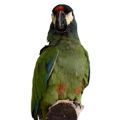Support your Illiger's Macaw with hand-picked supplies designed to meet its physical, nutritional, and behavioural needs. From premium parrot food and nutrient-packed treats to interactive toys, supplements, and travel-ready stands, this one-stop collection ensures your macaw stays stimulated, healthy, and content.
Ideal for both first-time owners and experienced carers, this selection includes trusted products from brands like Harrison's, Lafeber, Tidymix and more. Whether you're restocking food, replacing toys, or upgrading perches and feeding accessories, Parrot Essentials makes caring for your Illiger's Macaw easy and reliable.
Free delivery on orders over £39
Earn points with every purchase
Choose from natural, organic, and vet-recommended options
Shop the Full Range:
- Food & Treats: NutriBerries, soaking pulses, fruit blends
- Toys: Foraging puzzles, shreddables, foot toys
- Supplements: Feather care, probiotics, calcium, vitamins
- Cages & Stands: Secure enclosures and portable tabletop options
- Accessories: Perches, feeding dishes, sprays, and cleaning aids
5 FAQs
What is the best daily food for an Illiger's Macaw?
A well-rounded diet includes pellets (like Askio Nature or Harrison's), fresh vegetables and fruits, and seed blends or NutriBerries for variety. Avoid an all-seed diet for long-term health.
How often should I rotate toys?
Swap or rotate toys weekly to prevent boredom and encourage continued mental stimulation. Choose toys that support chewing, foraging, and climbing behaviours.
Do Illiger's Macaws need supplements?
Yes, calcium, feather support, and probiotic supplements can help maintain overall health, especially during moulting or stressful changes in environment.
Can I use these products for other macaw species?
Many items are suitable for similar-sized macaws and medium parrots, but always check product sizing and specifications for a proper fit.
What treats are healthiest for Illiger's Macaws?
Choose low-fat, natural treats like dried vegetables, fruits, or greens. Use sparingly (no more than 10% of the daily diet) and preferably in foraging toys.
 The Essentials for a Happy Illiger's Macaw
The Essentials for a Happy Illiger's Macaw



